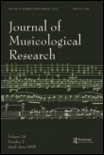
JOURNAL OF MUSICOLOGICAL RESEARCH
Scope & Guideline
Illuminating the Cultural Impacts of Music
Introduction
Aims and Scopes
- Interdisciplinary Approaches to Musicology:
The journal emphasizes interdisciplinary research, integrating insights from history, sociology, technology, and cultural studies to provide a holistic understanding of music. - Focus on Musical Instruments and Organology:
A consistent theme in the journal is the study of musical instruments, their history, and their cultural significance, often engaging with organology to explore the relationships between instruments and their socio-cultural contexts. - Exploration of Music and Identity:
The journal often investigates how music contributes to the construction of identity, examining themes such as nationalism, gender, and personal identity through musical practices. - Pedagogical Innovations in Music:
Research on music education and pedagogy is a core area, highlighting innovative teaching practices and the role of music in educational settings. - Historical and Contemporary Music Analysis:
The journal publishes analyses that span both historical and contemporary music, providing insights into how past musical practices influence current trends. - Cultural and Political Dimensions of Music:
Exploration of music's role in political movements and cultural expressions, particularly in the context of social justice and activism.
Trending and Emerging
- Digital Technologies in Musicology:
Recent publications emphasize the use of digital tools and technologies for studying music, such as 3D modeling of instruments and digital archiving, showcasing a trend towards innovative research methodologies. - Socioeconomic Perspectives on Music:
There is an increasing focus on the socioeconomic dimensions of music, examining how economic factors influence musical practices and the role of music in social stratification. - Cultural Identity and Nation Branding through Music:
Themes exploring how music contributes to cultural identity and national branding are emerging, particularly in the context of globalization and political movements. - Public Musicology and Community Engagement:
Research highlighting public musicology and community engagement is trending, reflecting a commitment to making musicological research accessible and relevant to broader audiences. - Gender and Music Studies:
The exploration of gender dynamics within music is becoming more prominent, with a focus on feminist perspectives and the representation of women in music history and practice. - Interdisciplinary Collaborations:
There is a growing trend towards interdisciplinary collaborations, where musicology intersects with fields such as environmental studies, psychology, and technology, broadening the scope of research.
Declining or Waning
- Traditional Classical Music Studies:
There appears to be a waning interest in solely traditional classical music studies, as more recent articles highlight contemporary and diverse musical forms, reflecting a broader cultural landscape. - Narrow Historical Focus:
Research that focuses exclusively on a narrow historical period or style is less frequent; the trend has shifted towards broader, more integrative analyses that connect various musical eras. - Purely Theoretical Musicology:
There is a decline in articles that focus solely on theoretical aspects of music without practical application, as the journal increasingly favors research that connects theory with real-world contexts and implications. - Exclusive Focus on Western Music:
The journal has moved away from an exclusive focus on Western music traditions, reflecting a growing interest in global music practices and the inclusion of diverse musical heritages.
Similar Journals

Musicologica Brunensia
Advancing Knowledge in the Art of SoundMusicologica Brunensia, an esteemed journal published by Masaryk University, Faculty of Arts, serves as a significant platform for the dissemination of knowledge in the field of musicology. Based in the Czech Republic, this Open Access journal has been facilitating scholarly communication since 2009, allowing unrestricted access to its rich array of research articles. With an ISSN of 1212-0391 and an E-ISSN of 2336-436X, Musicologica Brunensia proudly holds a Q3 ranking in the Music category as of 2023, reflecting its dedication to advancing research in the arts and humanities, particularly music. The journal accepts contributions spanning diverse topics within music studies, fostering interdisciplinary dialogue among researchers, professionals, and students alike. Located at Arne Novaka 1, Brno, 60200, Czech Republic, Musicologica Brunensia is poised to continue its journey of promoting innovative scholarship in musicology until 2024 and beyond, making it a valuable resource for anyone passionate about the field.
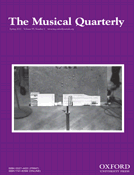
MUSICAL QUARTERLY
Fostering Insights in Music Theory and HistoryMUSICAL QUARTERLY, published by Oxford University Press Inc, is a distinguished journal in the field of music, with a publication history that stretches back to 1915. This esteemed journal, identifiable by its ISSN 0027-4631 and E-ISSN 1741-8399, provides a critical platform for scholarly discourse, analysis, and research in musicology and related disciplines, facilitating an understanding of both historical and contemporary musical practices. Although it operates without open access, it continues to attract a diverse readership of researchers, educators, and students alike, thanks to its well-curated articles and reviews that engage with music theory, history, and ethnomusicology. With a current Scopus rank of #119 out of 180 in the Arts and Humanities category and a 34th percentile ranking in Music, MUSICAL QUARTERLY plays a vital role in advancing knowledge and fostering collaboration within the music academic community. Its commitment to high-quality scholarship is reflected in its ongoing efforts to address the evolving landscape of music studies, making it an essential resource for anyone serious about exploring the rich tapestry of music scholarship.
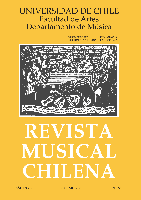
Revista Musical Chilena
Innovating Research in the Vibrant Landscape of MusicRevista Musical Chilena, an esteemed publication from the Faculty of Arts at Universidad de Chile, has been a pivotal platform in the field of music and cultural studies since its inception in 1945. With a commitment to open access, this journal promotes the dissemination of innovative research and critical discourse that bridges the gap between cultural theory and musical practice. Holding a notable Q2 ranking in both the Cultural Studies and Music categories as of 2023, it serves as a vital resource for scholars and professionals alike. The journal's inclusion in the Scopus database, with rankings that reflect its influence in the arts and humanities, underscores its significance in shaping the contemporary landscape of music studies. Given its convergence of research output from 2007 to 2024, Revista Musical Chilena continues to engage its audience with diverse scholarship that reflects Chilean musical heritage and global cultural dynamics.

MUSIK IN BAYERN
Fostering Insight into Bavaria's Musical TapestryMUSIK IN BAYERN is a distinguished journal devoted to the study of music within the rich cultural context of Bavaria, published by HANS SCHNEIDER. With the ISSN 0937-583X, this publication serves as an essential resource for researchers, professionals, and students interested in the historical and contemporary musical landscape of the region. Spanning topics from traditional Bavarian folk music to modern interpretations, the journal aims to foster a deeper understanding and appreciation of Bavarian music in a global context. Although the journal's coverage in Scopus has been discontinued, it remains an essential platform for scholarly communication and analysis in music studies. While MUSIK IN BAYERN operates under a subscription model, it continues to hold significance as an intellectual resource for advancing research in musicology.
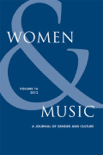
Women and Music-A Journal of Gender and Culture
Bridging Gender Studies and Musicology for a New EraWomen and Music: A Journal of Gender and Culture is a pioneering academic journal published by University of Nebraska Press, focusing on the intersection of gender and music. With a commitment to exploring issues pertinent to women and music in a range of cultural contexts, this journal provides a critical platform for scholars, musicians, and educators to share research that enriches our understanding of gender dynamics within the music industry and music's role in society. While currently not an open-access journal, it aims to make significant contributions to gender studies, cultural studies, and musicology, attracting a dedicated readership from various backgrounds. The journal is essential for those interested in feminist musicology and gender representation in the arts, fostering discourse that challenges traditional narratives and promotes inclusive scholarship. By bringing together diverse perspectives and innovative research, Women and Music continues to push boundaries and foster important conversations within both academic and artistic communities.
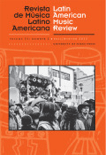
LATIN AMERICAN MUSIC REVIEW-REVISTA DE MUSICA LATINOAMERICANA
Unveiling the Cultural Tapestry of Latin American SoundsLATIN AMERICAN MUSIC REVIEW-REVISTA DE MUSICA LATINOAMERICANA stands as a prominent scholarly journal dedicated to the profound and diverse traditions of Latin American music. Published by University of Texas Press, this journal offers a platform for critical analysis, innovative research, and the dissemination of knowledge concerning the rich cultural heritage of Latin America. Although it currently does not provide open access options, the journal has made significant contributions to the field since its establishment, engaging a wide array of interdisciplinary perspectives. With coverage spanning from 2002 to 2009, the journal has been central to fostering scholarly dialogue and expanding the academic understanding of Latin American musicology, serving as an essential resource for researchers, professionals, and students alike. The journal is vital for those exploring the intersections of music, culture, and identity within the vibrant landscapes of Latin America.

Oido Pensante
Connecting Scholars and Sound in Meaningful WaysOido Pensante is a prominent open-access journal dedicated to the multifaceted field of music, published by the esteemed University of Buenos Aires, specifically through its Faculty of Philosophy and Letters, Institute of Anthropological Sciences. Since its inception in 2013, this journal has fostered a rich platform for scholarly discourse and innovative research at the intersection of music and cultural studies. With an ISSN of 2250-7116, Oido Pensante aims to bridge theoretical frameworks and practical applications, making significant contributions to the understanding of music in its social context. Currently, it holds an impressive Q3 ranking in the Arts and Humanities – Music category for 2023, with a Scopus rank of #99 out of 180 journals, reflecting its commitment to academic rigor and relevance. The journal's open access policy ensures that research is widely disseminated and accessible, making it an invaluable resource for researchers, professionals, and students alike in Argentina and beyond. With converged years from 2017 to 2024, Oido Pensante continues to expand its reach, encouraging intellectual exchange and stimulating dialogue within the music community.
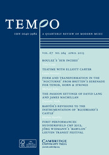
TEMPO
Illuminating Innovations in Music StudiesTEMPO, a renowned journal published by Cambridge University Press, is dedicated to the expansive field of music studies. With its rich history dating back to 1939, the journal has significantly evolved, offering researchers, professionals, and students a platform to explore diverse musical perspectives and innovations. Serving as a vital resource in its category, TEMPO is currently positioned in the Q2 quartile within the field of Music, reflecting its quality and academic influence. Although it operates under a traditional subscription model, its impactful contributions to music scholarship are underscored by its active engagement with contemporary issues in musicology, performance, and education. Researchers can rely on TEMPO for cutting-edge analyses, reviews, and critical discourse that shape the understanding of music in society.

Musica Oral del Sur
Advancing Scholarship in Oral Musical PracticesMusica Oral del Sur is a prominent academic journal published by the Junta Andalucía through the Centro Documentación Musical Andalucía. With its ISSN 1138-8579 and E-ISSN 2445-0391, this pioneering publication has championed open access since 1995, providing a vital platform for scholars dedicated to the exploration of traditional and contemporary oral music practices in Southern Spain and beyond. The journal is essential for researchers, professionals, and students interested in musicology, ethnomusicology, and cultural studies, promoting scholarly discourse through a rich assortment of articles, reviews, and field research. Set in the vibrant cultural landscape of Granada, the journal encourages the fusion of theoretical insights with practical implications, making significant contributions to the understanding of oral musical traditions. By fostering accessible academic dialogue, Musica Oral del Sur plays an invaluable role in preserving and highlighting the heritage of Southern musical expressions while addressing contemporary issues in the field.

RIVISTA ITALIANA DI MUSICOLOGIA
Exploring the Depths of Musical HeritageRIVISTA ITALIANA DI MUSICOLOGIA, published by the Italian Society of Musicology, is a distinguished journal dedicated to the field of musicology, offering a platform for scholarly research and discourse on a wide array of musical topics. With an ISSN of 0035-6867 and an E-ISSN of 2036-5586, this journal has contributed significantly to the understanding of music in cultural and historical contexts. Although the scope of coverage was marked from 2003 to 2008 in renowned databases like Scopus, the journal continues to serve as an invaluable resource for researchers, educators, and students embroiled in music studies. Its emphasis on rigorous research and critical analysis makes it a vital asset for anyone seeking to deepen their knowledge of musicological inquiry. While not an open-access publication, the RIVISTA ITALIANA DI MUSICOLOGIA remains a prestigious outlet for scholarly contributions that reach audiences eager to explore the complexities of musical heritage.